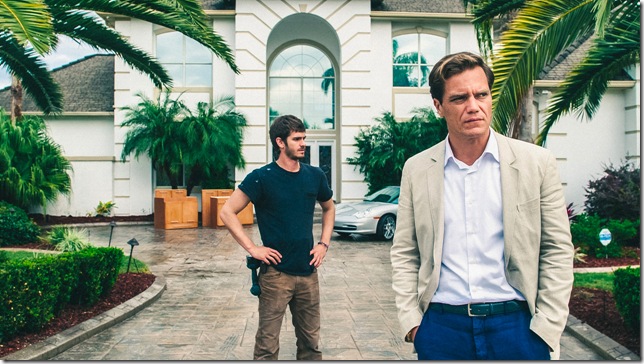Rick Carver is a perfect villain for the cutthroat housing market of 21st century. The antagonist of Ramin Bahrani’s 99 Homes is a vulture feasting on the carcass of the American Dream — and like his pinpoint-perfect surname suggests, he carves up the largest portions for himself.
As played by Michael Shannon in a crude, rapacious 180 from his compassionate cop in the LGBT drama Freeheld (also opening this week), Rick is a Realtor for bailed-out mortgage lenders like Fannie Mae and Bank of America, circa 2010. He’s the enforcer dispatched to foreclosed homes to evict the desperate tenants from what is now bank-owned property.
It would be an unenviable job for most of us: The opening shot of 99 Homes is a partially obscured image of a homeowner’s bloody body slumped on his toilet, a man who preferred suicide to relinquishing his house. A few scenes later, Rick is forced to clean a home inundated with feces — a going-away present from a former resident who knew his way around a septic tank. But Rick takes it all in stride. He carries a gun in his sock, wears a wrinkled white dress shirt like a rumpled Tom Wolfe, and puffs on e-cigs like mafia dons indulge post-hit cigars.
It takes a sociopath with a rare ability to compartmentalize tragedy and distance himself from it to not only work the job but reap enormous profits off the backs of human suffering. Or does it? 99 Homes is about how power and money can corrupt all of us, even the hardworking, bootstrapped strivers seeking a better life for their families.
In dire straits after Rick and his police entourage remove them from their lifelong Orlando house, single father Dennis Nash (Andrew Garfield), his son Connor (Noah Lomax) and his mother Lynn (Laura Dern) are forced to pack all of their belongings in their pickup truck and hit the road, like Dust Bowl casualties in The Grapes of Wrath, eventually settling into a shabby motel populated by similar victims of the Great Recession. But when Rick discovers that Dennis is a skilled construction worker and handyman desperate for employment in a barren industry, he enlists him for odd jobs that eventually become something more. He ultimately grooms Dennis into his protégé — a pistol-packing banksters’ emissary sent to evict people in the very position in which he found himself weeks earlier.
Rich in sobering ironies and received wisdom about the economic minefield of today’s suburban sprawl, 99 Homes is Bahrani’s second America-in-decline message movie in a row, following the earnest farmland sanctimony of At Any Price. 99 Homes offers a harsher and better diagnosis of a rooted problem, exposing the inherent heartlessness of a system run by callous banking institutions that, like casinos, always come out on top.
The imperfections of 99 Homes lie in its occasional contrivances, plot coincidences too convenient they could only emerge from a screenwriter’s transparent schematics. But even if the film’s foundation of plausibility grows shaky in the final reel, the results are never less than gripping. The fact remains that we’ve needed a film about this topic for some time, one that puts human faces on all those depressing fact-filled books released in the wake of the 2008 crash.
It’s an unspoken assumption that most audiences want to go to the movies to escape their problems, not confront them. But 99 Homes is never more effective than the montages of Dennis evicting foreclosed residents representing a cross-section of the erstwhile middle class: Asians, African-Americans, Hispanics, neglected seniors with nowhere to turn, and renters duped by unscrupulous landlords. Eschewing makeup, nobody looks like an actor; they all look like the people sitting around you in the movie theater, and that’s the point.
99 HOMES. Director: Ramin Bahrani; Cast: Andrew Garfield, Michael Shannon, Laura Dern, Noah Lomax, Tim Guinee; Distributor: Broad Green Pictures; Rating: R; Opens: Friday at most area theaters
